Traffic Court
Traffic Court Hours
The Traffic clerk’s offices are open daily Monday through Friday between the hours of 8:00 a.m. and 3:00 p.m.
- Phone: Call between the hours of 8:30 a.m. and 3:00 p.m.
- Email: Send an email to asktraffic@alameda.courts.ca.gov.
- Drop box: utilize one of the drop boxes located at the Fremont Hall of Justice, Wiley W. Manuel Courthouse, or the East County Hall of Justice.
NOTE: The following ARE NOT handled by the Alameda traffic department:
- Parking Tickets: Contact the citing agency.
- Criminal Violations: Driving under the influence (DUI) or any adult misdemeanor or felony violations are handled through the Criminal Division. Juvenile misdemeanor or felony violations are handled through the Probation Department.
- Citations Issued Outside Alameda County: Contact the respective County.
Traffic Court Schedule
Same day walk-in court is available at the following locations:
- Fremont Hall of Justice – 2nd Tuesday of each month;
- Oakland Wiley W. Manuel Courthouse – 2nd Thursday of each month.
In person or remote hearings must be scheduled in advance by contacting the Traffic Clerk’s office.
Traffic Court Schedule (PDF)
Traffic Court Services
-
Pay Your Traffic Ticket
-
Traffic Court Basics
Learn about different ticket types, how to request a lower fine, and delinquent traffic fines.
-
Contesting a Traffic Ticket
Learn how to contest a ticket and prepare for court.
-
Traffic School
Learn eligibility requirements for attending traffic school.
Coming Soon: How to check for Traffic School completion.
Traffic Court General Information & FAQs
Click on topics and FAQs below to access more information.
It is important to read the information on the front and back of your citation:
- Date and Time of the Citation
- Violations for which you were cited
- Issuing Agency
- Place and Time which you promised to appear
- Citation Number
- Misdemeanor Box
- Location of violation
- Issuing Officer
-
The date at the bottom of your citation is not a court date. It is the date by which you should take action on your citation.
By signing the citation in front of the officer, you have given your written promise that you will comply with the information written below your signature.
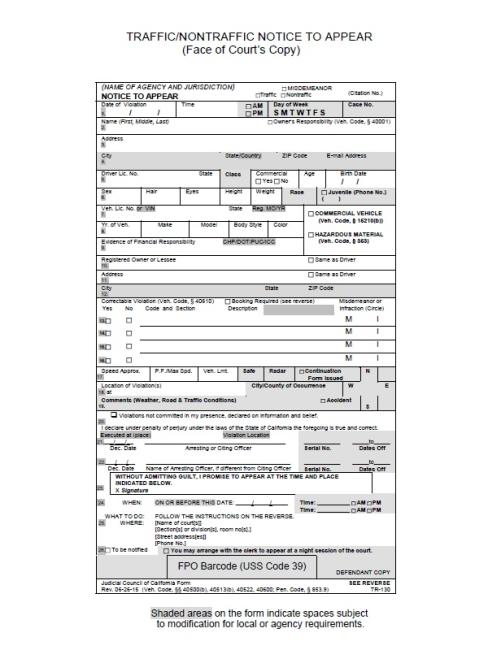
On the back of your citation you will see the following:
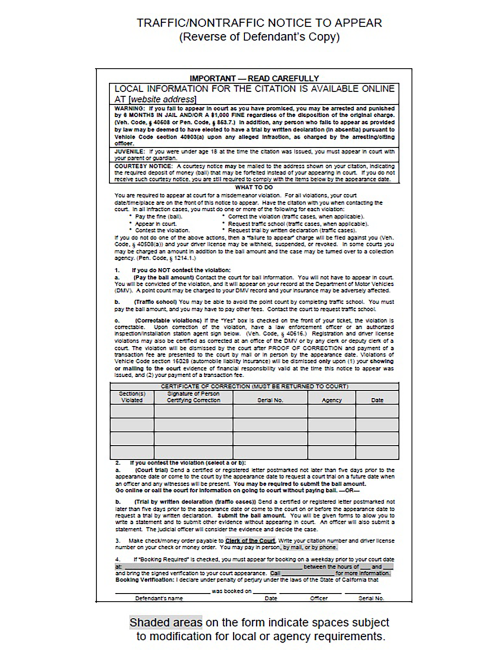
On the back of your citation you will see the following:
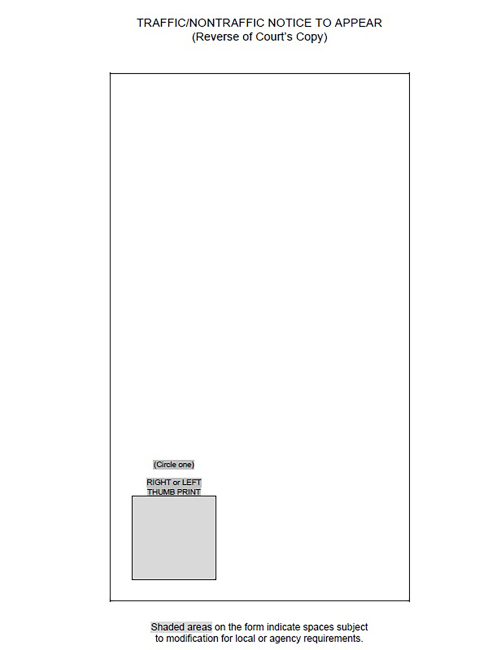
A courtesy notice will be mailed to the address on your citation. The notice contains general information about requirements and options available for resolving the ticket, which may include:
- Amount of bail, based on the violations and your prior driving history
- Proof of correction requirements for mechanical violations
- Mandatory court appearance requirements
- Traffic school eligibility requirements
- A return envelope to the court is provided with the courtesy notice.
The date at the bottom of your citation is not a court date. It is the date by which you should take action on your citation.
If you have not received a courtesy notice within four (4) weeks of receiving the citation, please bring your citation to one of the Traffic Division windows at the courthouse. Failure to receive a courtesy notice is not a legal excuse for failing to take care of the citation. It is your responsibility to resolve the citation on or before the due date. When submitting payments and/or documents by mail, allow 10 days for delivery and processing.
What if I have not received a Courtesy Notice?
If you do not receive a courtesy notice it may be because:
- The Court has not received the original citation from the law enforcement agency.
- Your current address may not be updated with the Department of Motor Vehicles, and you may not have shown the officer your change of address card along with your driver's license.
- The address written on the citation may be incorrect or incomplete.
- Information may have been missing from the citation and sent back to the officer to amend or correct.
- Post office error.
You are still responsible for contacting the Court whether you receive a notice or not. If you are unsure about your options, appear at the Court no later than the date listed at the bottom of your citation.
If you have not received a courtesy notice within four (4) weeks of receiving the citation, please bring your citation to the Traffic Division at one of the following locations:
- Fremont Hall of Justice
- Oakland Wiley W. Manual Courthouse
- East County Hall of Justice
Failure to receive a courtesy notice is not a legal excuse for failing to take care of the citation. It is your responsibility to resolve the citation on or before the due date. When submitting payments and/or documents by mail, allow 10 days for delivery and processing.
If you have a financial hardship that prevents you from paying for your household's basic needs and the full amount of your traffic ticket, you may ask the Court to consider your ability to pay. If you qualify, the Court may reduce the amount you owe.
Visit: Financial Hardship & Ability to Pay to learn more.
Eligibility
There are two ways to qualify for an ability-to-pay reduction:
1. If you receive public benefits under: SSI, SSP, CalWORKS, Tribal TANF, GR, GA, CAPI, IHSS, or Medi-Cal,
OR
2. If your income is at 250% or less of the federal poverty level.
NOTE: It is your responsibility to provide documentation that supports the requirements to qualify for a reduction.
How to Request an Ability to Pay Determination
To request an ability to pay determination, visit Financial Hardship & Ability to Pay.
Important Notes
- A defendant may request an ability-to-pay determination at adjudication, or while the judgment remains unpaid, including when a case is delinquent or has been referred to collections (Vehicle Code 42003(c)).
- The ability-to-pay determination is for infractions only (not misdemeanors or felonies).
- Once the court determines your ability-to-pay, you can ask it to reconsider if your financial circumstances change.
You have a right to petition the Court to vacate the civil assessment for good cause. Examples of good cause include, but are not limited to:
- Out-of-state military duty
- Hospitalization
- Incarceration
- You are not the person cited
How to Submit an Application to Vacate Civil Assessment
- Download the form from the Traffic Court homepage,
- Complete the form,
- Submit the form by mail or in person to the Traffic Division in Fremont, Oakland (Wiley W. Manuel), or Dublin (East County Hall of Justice).
- Although it is not required you submit proof of ‘good cause’ with your application, it is highly recommended.
A judicial officer will review your application and attachments, and a notice of decision will be mailed to the address indicated on your application.
You can get a copy of your citation at the courthouse traffic counter.
The following only applies if you have a preset arraignment or a preset court trial date.
You can look up your preset court date(s) using the Find Your Court Date Online Service.
You may also get this information at the courthouse traffic counter or by telephone. Please have your case number or citation number ready.
I got a citation that really belongs to someone else. How do I clear it?
- Non Photo Redlight Citation
If you believe that you have received a citation or notice from the court in error because someone else used your name or other identification, contact the Traffic Clerk's office.
Walk-In Court is available at the following Courthouses:
Fremont: Fremont Hall of Justice
Oakland: Wiley Manuel Courthouse
- Photo Redlight Citation
After a red light camera photograph is taken, the vehicle's registered owner will receive a citation in the mail. It will also include instructions about what to do next, including what to do if you, the registered owner, are not the person pictured behind the wheel.
Not the driver? Do not pay the citation if you plan to request it be taken out of your name.
If you are the owner and someone else is driving, do the following:
- Complete the "OPTION A: AFFIDAVIT OF NON-LIABILITY-IF YOU WERE NOT THE DRIVER" section on the 'Affidavit of Non Liability With BAIL' document on your notice of traffic violation.
- Use the pre-printed return address for the Photo Redlight Vendor to send the document back for processing.
Juvenile citations, Juvenile traffic misdemeanor violations, 14601.1s, 12500s, and VC 20002 are processed through the Probation Department along with other Juvenile violations.
Traffic infraction citations issued to minors are processed and adjudicated at the Superior Court Traffic Divisions. A courtesy notice will be mailed to the Parent/Guardian of the juvenile at the address listed on the citation within four weeks from the date the citation was issued. Follow the instructions on the notice exactly.
The date at the bottom of the citation is not a court date. It is the date by which you should receive a courtesy notice. If you have not received a notice within four weeks of receiving the citation, please bring the citation with your Parent/Guardian to one of the Traffic Division windows at the Courthouse.
The juvenile may be eligible to attend traffic school if he/she has not attended within the last 18 months. 18 months is calculated from the date of violation, not when traffic school was last attended. A Court administrative fee as well as a fee to the Traffic School must be paid. Upon successful completion of Traffic School, the citation will be dismissed.
If the juvenile wishes to contest the citation, the Parent/Guardian must schedule a hearing at which the Parent/Guardian must appear with the juvenile. The Parent/Guardian may do this in person or by mail.
Failure to appear or to comply with the instructions on the Courtesy Notice will result in a hold being placed against the juvenile's driving record, an increase in the bail due and may adversely affect the Parent/Guardian's insurance.
Fine Breakdown
Each violation listed on a citation is assessed a base fine. In addition to the base fine, there are additional assessments added to make up the total fine amount due to the court. The total fine amount due can also be increased by priors or points on a person's driving record. The amounts shown below are applicable to Alameda County and may not apply to other counties. Total fines for traffic violations may be calculated as follows:
Base Fine set by legislation and the Judicial Council of California. Penalty Assessment: Penalty assessments are allocated for such items as court and jail facility construction and other items as noted below.
- $10.00 per $10/base fine per PC 1464 goes 70% to State Trial Court Trust Fund; 30% to County General Fund.
- $2.00 per $10/base fine per GC 76100 goes to the County Courthouse construction fund.
- $2.50 per $10/base fine per GC 76101 goes to the County Jail Construction Fund.
- $0.50 per $10/base fine per GC 76102 goes to County Automated Fingerprint Fund.
- $2.00 per $10/base fine per GC 76104 goes to Maddy Emergency Medical Fund (State/County split).
- $3.00 per $10/base fine per GC 70372.(a) goes to State Court Facilities Construction Fund.
- $1.00 per $10/base fine per GC 76104.6 goes to the DNA Identification Fund (County/State split).
- $3.00 per $10/base fine per GC 76104.7 goes to the DNA Identification Fund (County/State split). (First $1 per $10 effective on violations on/after 07/12/06; additional $2 per $10 effective on violations on/after 06/10/10.)
- $2.00 per $10/base fine per GC 70372(a) goes to the State Court Facilities Construction Fund - Immediate and Critical Needs Account.
- DMV record fee pursuant to Vehicle Code 40508.6
- Twenty percent criminal surcharge pursuant to Penal Code 1465.7
- Court Security Fee pursuant to Penal Code 1465.8
- Criminal Conviction Assessment pursuant to GC 70373 goes to the State Court Facilities Construction Fund - Immediate and Critical Needs Account (assessed per conviction).
- Citation Processing Fee per GC 29500(c).
Bail Schedule
In addition, fines can be further enhanced pursuant to Vehicle Code 42009 for committing an offense while driving in a highway construction or maintenance area and pursuant to Vehicle Code 40210 for violations committed in a Safety Enhancement-Double Fine Zone. There are special violations with higher fines for violations committed in a school zone, a business district, a senior center zone, or at a railroad crossing.
The table below lists examples of the total bail amount due for a traffic fine. These amounts do not include any additional assessments due to priors or points on a driving record. If Traffic School is allowed, there is an additional $57.00 added to the total fine due.
| Violation | Base Fine | Penalty Assessment | Night Court fee | DMV Fee | 20% Criminal Surcharge | Court Security Fee | Total Fine Due |
|---|---|---|---|---|---|---|---|
| VC 12814.6 Failure to obey license provisions. | $35.00 | $104.00 | $1.00 | $10.00 | $7.00 | $40.00 | $197.00 |
| VC 14600(A) Failure to notify DMV of address change within 10 days. Note: The fine may be reduced with valid proof of correction. |
$35.00 | $104.00 | $1.00 | $10.00 | $7.00 | $40.00 | $197.00 |
What is a Penalty Assessment?
Penalty Assessment is an amount which is added to all fines and for bail for infractions and low grade misdemeanor offenses. It is charged pursuant to Government Code Section 76000 and Penal Code Section 1464 of the State of California and is subject to change by the Legislature. Click here to view the current penalty assessment amount.
Uniform Bail Schedule
1. How do I get my bail money back?
We will mail the bail refund to the depositor (the person who deposited the money with the Court). Refunds are generated electronically and mailed out.
2. How long will it take?
We will mail the bail refunds within 30 business days after the disposition of the case, or 30 business days after the order of exoneration. If you have not received your refund after 30 days, please call the Finance office at: 510-891-6217 or 510-891-6016.
3. Who does the court mail the bail refund to?
We mail the refund check to the person who deposited the bail money (the depositor). The depositor is the person who signed the personal check, money order, or cashier’s check.
4. If my address has changed, how do I tell the court?
When you go to court, tell the Deputy, Commissioner or Clerk that your address has changed. Or, you can send a letter to the court telling them about your change of address.
If you wish to appeal the administrative hearing decision made on your parking violation by the ticketing entity (city, county, and so forth), you have 30 days from the date of mailing of the decision to file an Appeal with the Superior Court. Please follow the instructions provided to you by the ticketing entity.
If you choose to appeal their decision, you must file your Appeal in the civil division of the Superior Court located at either the Rene C. Davidson Courthouse, 1225 Fallon Street, Oakland, or at the Hayward Hall of Justice, 24405 Amador Street, Hayward. There is a $25 fee for filing your Appeal.
May 1, 2017 - The Court has recently adopted a new program for individuals who are unable to pay traffic fines. For more information, click on the topic "What if I cannot afford to pay?" above, under Traffic Court General Information & FAQs.
Payments may be made online, using our automated phone system (IVR) 1-866-822-0560, by mail, and in person.
To pay by Internet
Click this link to pay your citation online. VISA and MasterCard accepted. Please note: Some citations cannot be processed online.
To pay by telephone
You can pay your citation over the telephone using our Automated Phone System (IVR) 1-866-822-0560. You will need a touch-tone telephone and a credit card (VISA and MasterCard accepted). Please follow the instructions on your courtesy notice for the appropriate phone number to call. There is a $6.00 convenience fee to use this service. Please note: Some citations cannot be processed using the Automated Phone System.
To pay by mail
Write your case number on your check and all correspondence. Make checks/money orders payable to "Alameda Superior Court". Mail the return portion of the courtesy notice and payment to the Court address listed on the Reminder notice. VISA and MasterCard accepted.
To pay in person
Visit the courthouse's Traffic Division to pay your Citation, at the Traffic counter. VISA and MasterCard accepted.
Fines
If you plead guilty or are found guilty by the Commissioner, you will be fined. You may pay the amount of the fine that same day or enter into a contract to make monthly payments until the fine is paid. If you are unable to pay the fine, you may request volunteer work at your court appearance. With this option, you work your fine off at the rate of $33.00 per hour.
Fremont: Fremont Hall of Justice
Oakland: Wiley Manuel Courthouse
Dublin: East County Hall of Justice
Delinquent fines
Delinquent traffic fines are referred to our collection agency. The court website online tool "Pay your Traffic Tickets" is not available for delinquent fines. Please go to the collection agency website to pay your delinquent traffic fine. If you have questions about your delinquent account, please call the collection agency at (844) 544-5358.
See also: Traffic Court Basics
Fix It - Proof of Correction
Correct (fix) the violation and then contact any law enforcement agency to arrange for an officer to verify and sign off on the correction. You can mail or bring the the signed verification to the Courthouse's Traffic Division along with the state mandated fee (40611 CVC) no later than the due date shown on your courtesy notice, to clear the violation.
Registration - Proof of Correction
If you are charged with expired registration, mail a copy of your current registration or bring your current registration to Courthouse's Traffic Division by the due date shown on your courtesy notice along with the state mandated fee (40611 CVC).
Driver's License - Proof of Correction
For driver's license violations, mail a copy of your driver's license or a citation/courtesy notice which has been signed off by the DMV or bring these or your driver's license to the Courthouse's Traffic Division by the due date shown on your courtesy notice along with the state mandated fee (40611 CVC).
Insurance - Proof of Correction
If you are charged with no proof of insurance, mail or bring proof that you were insured on the date of the violation to the Courthouse's Traffic Division counter by the due date shown on your courtesy notice along with the state mandated fee (40611 CVC).
Valid proof of insurance may be any one of the following:
- A photocopy of the official card issued by an insurance company showing name of the insurance company, including:
- policy number
- effective (beginning and ending) dates of the policy (policy must be in effect at the time of the violation)
- name of defendant or vehicle information (must match person or vehicle listed on the citation)
- A photocopy of the actual insurance policy providing all of the above information
- A statement on insurance company letterhead providing all of the above information
Notice to Correct (CHP 281)
This citation is issued by the California Highway Patrol for certain types of correctable violations. You are required to submit proof of correction(s) directly to the CHP within 30 days from date of violation. Failure to comply will result in the citation being referred to the court.
Why is there a proof of correction fee when the officer said there would be no fee?
The proof of correction fee is statutory (Vehicle Code section 40611) for all correctable violations.
Am I responsible for an equipment violation on a car I am driving that is not mine?
Yes, unless the ticket is issued in the name of the registered owner of the vehicle you are driving.
What if I have sold the car that was cited for an equipment violation or it is inoperable?
Selling a vehicle that has been cited for mechanical violations does not relieve the owner of the responsibility of the proof of correction for those violations. If you have sold or donated the car or it has become inoperable, you must set a court date to appear and provide proof of sale, donation, or inoperability to clear the ticket. You should support your case with any relevant paperwork.
DMV Hold
A DMV hold may be set for failure to appear (40508a CVC), or a failure to comply (40508c CVC). To clear a DMV Hold, you must post and forfeit bail or post bail and schedule a future court date. The DMV hold is removed once bail is posted.
Payment may be made online, using our Automated Phone system (IVR) 1-866-822-0560, in person, or by mail.
Note: if you want a trial, payment can only be made at the court, or via US Post, not online.
Make money order or cashier's check payable to CLERK OF THE COURT. Write your case number on the check and any correspondence. Mail the return portion of the courtesy notice and payment to the Court address listed on the courtesy notice. You will receive your court date, if needed, by return mail.
The Citation Date the officer writes next to WHEN on the citation indicates that by or before that date you should receive a Courtesy Notice.
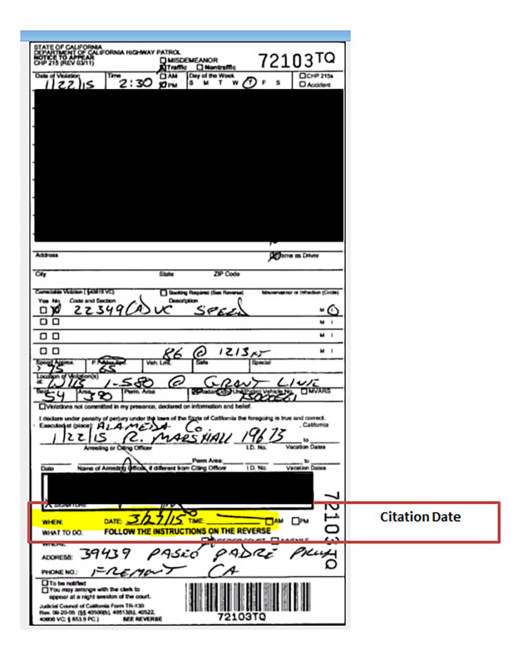
When you receive the Courtesy Notice, it will have the actual Due Date for your citation.
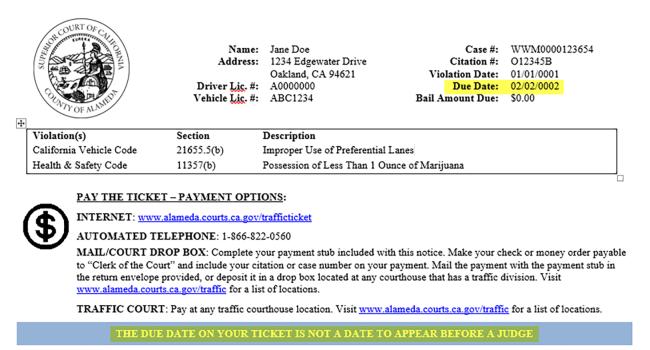
If you have not received a Courtesy Notice by or before the Citation Date, contact us at Ask Traffic.
Failure to appear or to resolve a citation on or before the due date may result in a DMV hold being placed on your driver's license. Your bail may also be increased and a Civil Assessment imposed. A DMV hold will restrict your driving privileges and/or ability to register a vehicle. The citation may also be referred to a collection agency for the collection of payments due. In addition, the court may deem your failure to appear as an election to proceed with the case by trial by written declaration pursuant to Vehicle Code section 40903.
Attention: Failure to pay your fine may result in increased financial penalties.
Failure to Appear (40508a CVC)
Failure to appear on your scheduled court date may result in one or more of the following penalties:
- A Civil Assessment may be imposed and your case referred to collection
- You may be tried in absentia (in your absence)
Civil Assessment
Pursuant to Penal Code 1214.1, ". . . the court may impose a civil assessment of $100 against any defendant who fails, after notice and without good cause, to appear in court for any proceeding authorized by law or who fails to pay all or any portion of a fine ordered by the court."
Acceptable good cause is defined as written proof of medical incapacitation, hospitalization, incarceration, or out-of-state military duty. Proof must be verifiable and written on appropriate letterhead stationery.
Failure to respond within 15 days of a Civil Assessment notice will result in the entry of a civil judgment and referred to collection. In addition, a request may be sent to DMV to suspend your driver's license based on your failure to appear.
To avoid these penalties, the original bail plus the civil assessment amount must be received by the court within 15 days of the notice. Proof of correction for appropriate violations must accompany the payment to clear the case. Return the notice with your payment and any required proof of correction.
Owner's Responsibility
When a "hold" is issued, a notice is usually mailed to you. This notice informs you that additional fees were added to the original bail amount owed. Once the Court issues a "hold" on your citation, you may not be able to register your vehicle until this issue is resolved. Once the bail/fine is paid or a court appointment is reserved, the court will remove the DMV hold.
DMV Hold
When a "hold" is issued, a notice is usually mailed to you. This notice informs you that additional fees were added to the original bail amount owed. Once the Court issues a "hold" on your citation, you may not be able to renew your license until this issue is resolved.
Once the bail/fine is paid or a court appointment is reserved, the court will remove the DMV hold.
The due date shown on your courtesy notice may be extended only once. This one time extension of 30 days may be requested:
- Online
- At the Courthouse traffic counter (See your citation for appropriate location).
- By US mail (See your citation for appropriate location).
- By telephone (See your citation for appropriate location). Please have your case number or citation number ready.
Extensions for more than 30 days require a court appearance. Extensions may not be granted on delinquent matters.
What is a Photo Red Light Violation
Cameras have been installed at specific signal controlled intersections to take video and pictures of vehicles which cross the intersection on a red light. A photo is taken of the front of the vehicle and front license plate when the vehicle’s speed and position trip a sensor located before the intersection a photo is also taken of the driver when the vehicle enters the intersection on a red light. The photo information is submitted to law enforcement through an automated records database and a citation is mailed to the registered owner of the vehicle.
Courtesy Notice
You will receive two courtesy notices, one from the Redlight Vendor and one from the Court. They will outline the details of your violation and your options to resolve the violation.
View Video Violation
The courtesy notice will provide steps on how you can view your violation online using the following link View Your Photo Red Light Video. You may also view your violation on kiosks located at the Citing Agency.
Payment
Payment may be made online, using our IVR phone system 1-866-822-0560, by mail, or in person.
Contest in Court
To contest your violation, please click on the topics "How do I contest my Citation" and "How do I prepare for Court" on this page.
Not the Owner
If you are the person in the Red Light camera photograph and were driving a company car, do the following: Have your company complete the "Option A: Affidavit Of Non-Liability-If You Were Not The Driver" section on the 'Affidavit on Non Liability With Bail' document. Use the pre-printed return address for the Photo Redlight Vendor to send the document back for processing.
DO NOT SEND this document to the court. Doing so will result in delaying processing for your citation.
It is recommended that the requested documentation be sent certified mail with a return receipt.
Upon receipt of the above documentation, the Citing Agency will dismiss the citation from the company's name and issue a citation to the person that has been identified as the driver. The citation in the company's name will not be dismissed until the Court has received the completed identification form or payment has been made.
If the citation is to be taken out of the company name: Do Not Pay The Citation.
Not the Driver
Please click on the topic "I was not the driver" on this page.